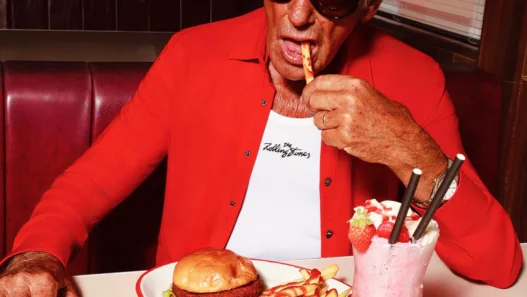An End Of An Era For Actual Natives: Ron Herman, Icon Of The L.A. Retail Scene, Is Closing After More Than 45 Years In Business On Melrose Avenue.
“For decades, Ron Herman was a pioneer in the Los Angeles retail scene.
His ivy-covered store on a busy corner of Melrose Avenue was known for stocking up-and-coming fashion labels, many of them born and bred in Southern California, and showcasing trendy brands no one else had.
When he introduced a new premium denim label in 2005 called J Brand, it skyrocketed to success. “Ron always had the best merchandise,” said J Brand’s cofounder Jeff Rudes, who in 2012 sold 80 percent of his company to Fast Retailing in Japan for $290 million. “We had a huge reaction from what we sold at Ron’s and the rest is history.”
That history is ending after more than 45 years. The Ron Herman store at 8100 Melrose Avenue will be closed as of Dec. 23. The retailer has already shuttered its nearby outposts in Brentwood and Malibu.
“California-based retailer Ron Herman has made a strategic decision to reshape its U.S. operations,” according to a statement released by Tokyo-based Sazaby League Ltd., the Japanese venture that acquired the Ron Herman business in 2019. “The company has decided to scale back its current retail footprint by closing its Los Angeles stores with sights set on renewing its dynamic digital and physical presence in California and abroad.”
Sazaby said it does not see Ron Herman vacating the U.S. market, just reorganizing. It will keep its Ron Herman store in Honolulu operating in Waikiki Beach and will move forward with a blended physical/online presence, including third-party and private-label merchandise in the United States.
But the demise of the flagship is a major blow to the L.A. fashion scene, and another indicator of a challenging retail environment exacerbated by the months-long actors and writers strikes that were recently settled.
In its heyday, “Ron Herman was the store to usher in all these different talented California designers,” said John Eshaya, who worked there from 1984 to 2008, starting out as a salesperson in the T-shirt department and ending up as the vice president and head buyer of the women’s department. He went on to found his own label. “What Ron Herman did was to put L.A. style on the fashion map.”
In 1995, Ron Herman, with Eshaya’s help, exposed the fashion world to the now very successful Trina Turk label, currently sold at Saks Fifth Avenue, Neiman Marcus and Nordstrom. The L.A. designer remembers how it all happened. “I had purchased full rolls of gorgeous vintage silk jersey prints from a fabric shop that was going out of business,” she explained. “I have fond memories of showing John the fabric rolls from the trunk of my car in the parking lot at Fred Segal [where Ron Herman had a store within the store.] We ended up cutting all of the vintage printed fabric for his store exclusively. It helped to establish the color and print identity of Trina Turk, which continues today.”
The Ron Herman store also helped introduce Earl Jean in 1996 when few people were familiar with the concept of a pricey low-rise denim pant. Other brands the retailer made famous were Juicy Couture and BCBG, before it became BCBGMaxAzria. “It used to be the first place that people would go when they landed at the airport as a tourist,” Rudes recalled.
Audrey McLoghlin, who started her L.A.-based Frank & Eileen brand of high-end linen and cotton shirts nearly 15 years ago and has expanded into other categories, said Ron Herman was her first retail partner and her first mentor. Her shirts, which sell for $238 to $278, are still being sold there.
“He helped shape my career and whole-heartedly contributed to the success of Frank & Eileen globally,” McLoghlin said in an email. “Ron created a one-of-a-kind retail environment that was ahead of its time and was a destination for 50 years. Ron Herman is a legend in Los Angeles, Japan, and across the entire fashion industry and will remain a legend for eternity.”
That legend of a go-to retail outpost for trendy clothing had a long life, until Herman decided to retire and sold his stores to Sazaby League Ltd., which started licensing the Ron Herman brand 14 years ago. The conglomerate is also the Japanese distributor for Canada Goose, Wolford and many more brands. It helped expand the Ron Herman brand throughout Japan where there are now 13 Ron Herman stores and seven RHC stores crisscrossing the Asian country.
Ron’s road to retail started out more than 50 years ago when he was in his 20s. His uncle was the famous retailer Fred Segal, who began his own foray into retail in 1961 with a unique concept. He opened a Fred Segal store on Melrose Avenue, which Ron Herman eventually took over, that provided a space for an array of shop-in-shop boutiques. These boutiques offered highly curated merchandise ranging from jeans and T-shirts to designer shoes and bags.
In 1971, Segal offered his nephew, who had graduated a few years earlier from the University of California, Berkeley, a job. Herman’s career moved quickly at Fred Segal, and soon he became president of the company, which had a second store in Santa Monica. But he wanted to be his own boss. So, in 1976, he bought 600 square feet of retail space inside the Melrose Avenue compound and named it Ron Herman. The business took off.
By 2012, Fred Segal had sold the worldwide rights to his brand to Sandow Media, a New York-based company that builds multichannel, vertically integrated brands. The Fred Segal store in Santa Monica was eventually closed, and Ron Herman remained at the Melrose Avenue location. Ron Herman outposts were added in Brentwood and Malibu.
To wrap things up at the Melrose Avenue store, a major sale is going on. Many of the labels, including Nili Lotan, Isabel Marant, Missoni, Maria Cher and Raquel Allegra, are 50 percent off. On Black Friday, everything in the store will be sold at a 60 percent discount.
The store’s absence will leave a huge void. “I’ll miss Ron Herman on Melrose for a number of reasons but mostly for having been, in good and bad times, a favorite destination for locals, tourists, fashionistas, celebrities, industry experts, students and ordinary people shopping the Southern California vibe,” said Maurizio Donadi, an Italian designer based in L.A. who saw many of his upcycled creations and collaborations sold at the store. “Ron Herman had them all. … The industry will probably lose a place for brands and ideas to develop and some new talent to” – Hollywoodreporter.com


















